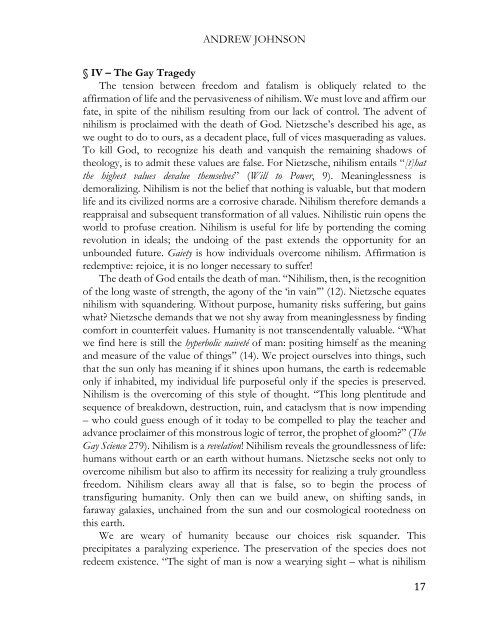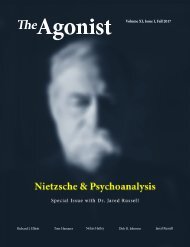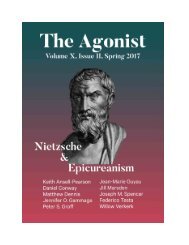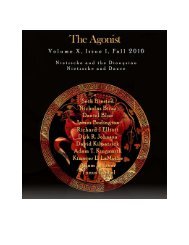Volume XII, Issue II, Spring 2019
You also want an ePaper? Increase the reach of your titles
YUMPU automatically turns print PDFs into web optimized ePapers that Google loves.
ANDREW JOHNSON<br />
§ IV – The Gay Tragedy<br />
The tension between freedom and fatalism is obliquely related to the<br />
affirmation of life and the pervasiveness of nihilism. We must love and affirm our<br />
fate, in spite of the nihilism resulting from our lack of control. The advent of<br />
nihilism is proclaimed with the death of God. Nietzsche’s described his age, as<br />
we ought to do to ours, as a decadent place, full of vices masquerading as values.<br />
To kill God, to recognize his death and vanquish the remaining shadows of<br />
theology, is to admit these values are false. For Nietzsche, nihilism entails “[t]hat<br />
the highest values devalue themselves” (Will to Power, 9). Meaninglessness is<br />
demoralizing. Nihilism is not the belief that nothing is valuable, but that modern<br />
life and its civilized norms are a corrosive charade. Nihilism therefore demands a<br />
reappraisal and subsequent transformation of all values. Nihilistic ruin opens the<br />
world to profuse creation. Nihilism is useful for life by portending the coming<br />
revolution in ideals; the undoing of the past extends the opportunity for an<br />
unbounded future. Gaiety is how individuals overcome nihilism. Affirmation is<br />
redemptive: rejoice, it is no longer necessary to suffer!<br />
The death of God entails the death of man. “Nihilism, then, is the recognition<br />
of the long waste of strength, the agony of the ‘in vain’” (12). Nietzsche equates<br />
nihilism with squandering. Without purpose, humanity risks suffering, but gains<br />
what? Nietzsche demands that we not shy away from meaninglessness by finding<br />
comfort in counterfeit values. Humanity is not transcendentally valuable. “What<br />
we find here is still the hyperbolic naiveté of man: positing himself as the meaning<br />
and measure of the value of things” (14). We project ourselves into things, such<br />
that the sun only has meaning if it shines upon humans, the earth is redeemable<br />
only if inhabited, my individual life purposeful only if the species is preserved.<br />
Nihilism is the overcoming of this style of thought. “This long plentitude and<br />
sequence of breakdown, destruction, ruin, and cataclysm that is now impending<br />
– who could guess enough of it today to be compelled to play the teacher and<br />
advance proclaimer of this monstrous logic of terror, the prophet of gloom?” (The<br />
Gay Science 279). Nihilism is a revelation! Nihilism reveals the groundlessness of life:<br />
humans without earth or an earth without humans. Nietzsche seeks not only to<br />
overcome nihilism but also to affirm its necessity for realizing a truly groundless<br />
freedom. Nihilism clears away all that is false, so to begin the process of<br />
transfiguring humanity. Only then can we build anew, on shifting sands, in<br />
faraway galaxies, unchained from the sun and our cosmological rootedness on<br />
this earth.<br />
We are weary of humanity because our choices risk squander. This<br />
precipitates a paralyzing experience. The preservation of the species does not<br />
redeem existence. “The sight of man is now a wearying sight – what is nihilism<br />
17









